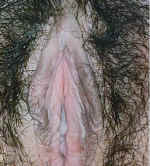|
|
Operational Obstetrics & Gynecology
Lichen Sclerosis
Lichen sclerosis is one form of vulvar dystrophy. With lichen sclerosis, the skin of the vulva is too thin.
Clinically, women with lichen sclerosis complain of chronic vulvar itching and irritation. Tissues may be fragile, tear easily and result in superficial bleeding. Using only casual observation, the vulva may appear normal, but closer inspection will reveal a whitish discoloration and loss of anatomic differentiation of the vulvar structures.
It may be difficult, without a vulvar biopsy, to distinguish lichen sclerosis from the other forms of vulvar dystrophy (hypertrophic vulvar dystrophy and mixed dystrophy). For this reason, women suspected of having lichen sclerosis usually undergo vulvar biopsy to confirm the diagnosis.
Lichen sclerosis can occur in any age group, is not related to lack of estrogen, and its' cause is not known.
As a general rule, topical steroids give only very limited relief and if used for any length of time (more than 2 weeks) can make the condition worse because they tend to thin the skin even more. The important exception to this rule is the topical synthetic fluorinated corticosteroid, Clobetasol, which has been very effective in eliminating symptoms and restoring the normal anatomy of the vulva.
 0.05% clobetasol propionate cream is applied to the vulva twice daily
for one month, than at bedtime for one month and then twice a week for three months. It is
then used as needed one or two times per week. Using this approach, 95% of patients will
notice significant improvement and 75% will report complete remission of symptoms.
0.05% clobetasol propionate cream is applied to the vulva twice daily
for one month, than at bedtime for one month and then twice a week for three months. It is
then used as needed one or two times per week. Using this approach, 95% of patients will
notice significant improvement and 75% will report complete remission of symptoms.
Traditional therapy consists of
2% testosterone propionate in petroleum jelly, applied 3 times a day for 3 to 6 months or until the symptoms are relieved. Then the applications are gradually reduced to a level of one or two applications per week.
*These videos are an added feature, provided by the Brookside Associates Medical Education Division. They were not present in the original edition.
Home · Introduction · Medical Support of Women in Field Environments · The Prisoner of War Experience · Routine Care · Pap Smears · Human Papilloma Virus · Contraception · Birth Control Pills · Vulvar Disease · Vaginal Discharge · Abnormal Bleeding · Menstrual Problems · Abdominal Pain · Urination Problems · Menopause · Breast Problems · Sexual Assault · Normal Pregnancy · Abnormal Pregnancy · Normal Labor and Delivery · Problems During Labor and Delivery · Care of the Newborn
|
Bureau of Medicine
and Surgery |
Operational
Obstetrics & Gynecology - 2nd Edition |
This web version of Operational Obstetrics & Gynecology is provided by The Brookside Associates Medical Education Division. It contains original contents from the official US Navy NAVMEDPUB 6300-2C, but has been reformatted for web access and includes advertising and links that were not present in the original version. This web version has not been approved by the Department of the Navy or the Department of Defense. The presence of any advertising on these pages does not constitute an endorsement of that product or service by either the Department of Defense or the Brookside Associates. The Brookside Associates is a private organization, not affiliated with the United States Department of Defense. All material in this version is unclassified.
This formatting © 2006
Medical Education Division,
Brookside Associates, Ltd.
All rights reserved